READER COMMENTS ON
"RAGING BULL: Radical Activist Jurist Antonin Scalia, Legislating from the Bench"
(56 Responses so far...)
COMMENT #1 [Permalink]
...
Ernest A. Canning
said on 3/1/2013 @ 8:17 am PT...
Scalia, who together with Thomas, is a regular attendee at the Koch seminars aptly fits what Law Prof Cass Sunstein described as "radicals in robes."
The claims they and other Federalist Society jurists have made about "strict construction" have always been part of the shell game they have applied to mask their plutocratic agenda.
One of the most basic tenets of constitutional law lies in the deference the "unelected" courts owe to the "elected" Congress. A court is not supposed to speculate as to why Congress acts or to substitute its judgment for that of the elected branch on the wisdom of the legislation.
Consider the following colloquy between Justice Kagan and Justice Scalia, with Alabama's counsel serving as their foil. (Emphasis added).
JUSTICE KAGAN: And in 1986 --- or excuse me, 2006 --- Congress went back to the problem, developed a very substantial record, a 15,000-page legislative record, talked about what problems had been solved, talked about what problems had yet to be solved, and decided that, although the problem had changed, the problem was still evident enough that the act should continue.
It's hard to see how Congress could have developed a better and more thorough legislative record than it did,
MR. REIN …The question is whether what Congress found was adequate to invoke this unusual remedy.
JUSTICE SCALIA: Indeed, Congress must have found that the situation was even clearer and the violations even more evident than originally, because originally, the vote in the Senate, for example, was something like 79 to 18, and in the 2006 extension, it was 98 to nothing. It must have been even clearer in 2006 that these States were violating the Constitution. Do you think that's true?
MR. REIN: No...
JUSTICE KAGAN: Well, that sounds like a good argument to me, Justice Scalia. It was clear to 98 Senators, including every Senator from a covered State, who decided that there was a continuing need for this piece of legislation.
JUSTICE SCALIA: Or decided that perhaps they'd better not vote against it, that there's nothing, that there's no --- none of their interests in voting against it.
The "perhaps" is precisely the type of speculation that a real jurist would never engage in.
COMMENT #2 [Permalink]
...
Ralph Crown
said on 3/1/2013 @ 8:46 am PT...
Scalia is a hack who should be impeached immediately, or better yet hung for treason.
COMMENT #3 [Permalink]
...
Brad Friedman
said on 3/1/2013 @ 11:20 am PT...
Ernie -
Say what one will about Scalia, he's not a stupid man (is he?) And yet, as you'll note in the clip you posted, he says:
Congress must have found that the situation was even clearer and the violations even more evident than originally, because originally, the vote in the Senate, for example, was something like 79 to 18, and in the 2006 extension, it was 98 to nothing. It must have been even clearer in 2006 that these States were violating the Constitution. Do you think that's true?
Of course, he disingenuously (sarcastically) suggests the increased support for the law in Congress in 2006 vs. 1965 must be because "the violations [are] even more evident than originally ... even clearer in 2006 that these States were violating the Constitution".
He obviously doesn't believe that's the case (but rather, as I note in the original article, that it must be because Congress members are just too too frightened, those gentle flowers, to vote against the law if they don't like it.)
But rather than offer a legit reason for the increase in support --- say, Congress members have realized the importance of the law since 1965, witnessed its great success so support it in larger numbers, or even that, thanks to the change in social conditions they are LESS AFRAID to vote IN FAVOR OF IT now --- he presumes, with no evidence whatsoever, that it's because they are all afraid to vote AGAINST it.
Either way, as you appropriately note, it's not his job --- not by a long shot --- to try and speculate on why anybody voted for or against it. They supported it. They did their job (for once.) And, as in other cases where he's argued that legislative determinations hold great weight, he ought to give deference to Congress' findings and judgement.
But, of course, as mentioned, he doesn't, because he's an extremist political hypocrite, as opposed to a reasoned, if ideological, jurist. In short, he's a disgrace to the nation and an embarrassment to the court.
COMMENT #4 [Permalink]
...
WingnutSteve
said on 3/1/2013 @ 12:03 pm PT...
I disagree with Scalia, but I also find it laughable to preemptively say he's "legislating from the bench". How does a line of questioning you obviously disagree with equate to legislating? What "legislation" did this activist judge force on the American people? I thought not.
The simple fact is that political views determine in each persons mind what is and isn't judicial activism. I feel that Roberts re-writing the Obamacare law as a tax, which they specifically said it wasn't one, was probably the most ridiculous case of judicial activism in many years. And expect that most folks who read this blog would vehemently disagree with me. Simply because they agree with the ruling.
COMMENT #5 [Permalink]
...
Brad Friedman
said on 3/1/2013 @ 12:55 pm PT...
WingnutSteve @ 4 -
I disagree with Scalia, but I also find it laughable to preemptively say he's "legislating from the bench". How does a line of questioning you obviously disagree with equate to legislating? What "legislation" did this activist judge force on the American people? I thought not.
Um, you've not heard of Citizens United? Or Bush v. Gore for that matter?! You've not read his previous opinions on the VRA in other cases? I thought not.
That said, you are actually suggesting that the argument Scalia offered that the judiciary is needed to undo a 98 to 0 vote by the Senate would not be "legislating from the bench"? Seriously? Or, are you just saying that because he has yet to deliver his official opinion that he he is not yet legislating from the bench (in this case)?
The simple fact is that political views determine in each persons mind what is and isn't judicial activism.
No, actually, it's not really an "opinion thing", it's an empirical thing. Does a judge attempt to rewrite a law from the bench? Does he/she actively work to change a law as written and passed by the legislative branch? (For example, Roberts taking the unprecedented step of asking Citizens United to go away, and come back to refile their case with a challenge on bans on corporate campaign money from McCain-Feingold, which is a far broader challenge than the original case was to have determined.) Or, as in this case, when nobody has argued that a 98 to 0 decision by Congress was illegitimate, when that was not a part of the original case being heard in any way, shape or form, does a Supreme Court Justice attempt to bring into court such a justification for killing such a law, even though that point was never at issue in the case they are hearing to start with?
I suspect, if a judge found, for example, that a particular law requiring a transvaginal ultrasound before an abortion could be performed was dismantled due to the fact that every single legislator had voted in favor it, you'd probably find that to be an "activist" motivation. But maybe that's just me.
I feel that Roberts re-writing the Obamacare law as a tax, which they specifically said it wasn't one, was probably the most ridiculous case of judicial activism in many years. And expect that most folks who read this blog would vehemently disagree with me. Simply because they agree with the ruling.
Why would that be a case of "activism"? He offered his findings as to the constitutionality of the law, by citing a specific provision in the Constitution. You may agree or disagree with his findings (as I might), but how is that "activism"? How did he change, from the bench, in any way, a law that was duly passed by the Legislature and signed by the Executive? How did he "legislate from the bench" in that case? As opposed to what we saw in Citizens United (which gutted huge portions of Congressional law), or Bush v. Gore (which interceded, for the first time, in a state court's ruling on a matter specifically left to states by the Constitution) or in what Scalia is suggesting will be a reason to nullify a 50-year law most recently re-authorized by a unanimous Senate after 10 months of deliberation, 21 hearings and 15,000 pages of evidence to support its vote in favor of the law???
Methinks you don't know what "judicial activism" actually is, and may be confusing it for an opinion (which you or I may be for or against.)
COMMENT #6 [Permalink]
...
WingnutSteve
said on 3/1/2013 @ 8:22 pm PT...
The point I made was your charge of legislating from the bench in this case, which Scalia, in this case, did not do.
I disagree with Citizens United and have stated my position here quite a few times. That was an interpretation by the court of what constitutes "people" and while I don't like their ruling I understand it. The difference between us on that is I would take the political money away from Corporations, Unions, any and all other organizations while you would only take it away from those which support Republican or conservative candidates.
In Bush V. Gore the court found that the state cannot change their election laws in the middle of the election. The activism, or legislating from the bench, was in the ruling of the Florida Supreme Court that threw out a state law on certification of their election. If the Supreme Court had let that stand what's to stop any other state court from changing the law because they don't like the outcome of an election?
Happy Friday!
COMMENT #7 [Permalink]
...
Meremark
said on 3/2/2013 @ 12:28 am PT...
The decrepit mental condition of Scalia --- clinical diagnosis verfied by fMRI brain-scan monitors --- and a scattered factious few others, incompetent, is Catholic brain. Ashcroft also.
Now they have no Pope. They're goners.
They're mentally medieval. Let us dip them in a litmus test from now on, and retroactively, so as to disqualify any Catholic brain which hasn't grown beyond it.
But seriously, Brad, Ernest, how can you ever again take the Supreme kangaroo Court seriously, since Bush Sr threw up Clarence Thomas' nomination? And Bush v. Gore, and the unfit and indecent panel who heard it ... Sandra Day O'Connor is gone self-shamed into blacker infamy than Quisling, Benedict Arnold, Judas.
Criminalize Opus Dei: Enemy of humankind.
COMMENT #8 [Permalink]
...
Meremark
said on 3/2/2013 @ 12:35 am PT...
Please disappear comment #7 for its typo, corrected here:
-
The decrepit mental condition of Scalia --- clinical diagnosis verfied by fMRI brain-scan monitors --- and a scattered factious few others, incompetent, is Catholic brain. Ashcroft also.
Now they have no Pope. They're goners.
They're mentally medieval. Let us dip would-be judges in a litmus test from now on, and retroactively, so as to disqualify any Catholic brain which hasn't matured.
But seriously, Brad, Ernest, how can you ever again take the Supreme kangaroo Court seriously, since Bush Sr threw up Clarence Thomas' nomination? And the Bush v. Gore criminal monstrosity, and the unfit and indecent panel who heard it ... Sandra Day O'Connor is gone self-shamed into blacker infamy than Quisling, Benedict Arnold, Judas.
Criminalize Opus Dei: Enemy of humankind.
-
COMMENT #9 [Permalink]
...
Meremark
said on 3/2/2013 @ 12:41 am PT...
Ohmygawd. Vestigial italics. Turn OFF my Typos. Disappear comments #7 and #8. pleeeease. Start over:
-
The decrepit mental condition of Scalia --- clinical diagnosis verfied by fMRI brain-scan monitors --- and a scattered factious few others, totally incompetent, is Catholic brain. Ashcroft also.
Now they have no Pope. They're goners.
They're mentally medieval. Let us dip would-be judges in a litmus test from now on, and retroactively, so as to disqualify any Catholic brain which failed to mature more.
But seriously, Brad, Ernest, how can you ever again take the Supreme kangaroo Court seriously, since Bush Sr threw up Clarence Thomas' nomination? And the Bush v. Gore criminal monstrosity, and the unfit and indecent panel who heard it ... Sandra Day O'Connor is gone self-shamed into blacker infamy than Quisling, Benedict Arnold, Judas.
Criminalize Opus Dei: Enemy of humankind.
-
COMMENT #10 [Permalink]
...
Meremark
said on 3/2/2013 @ 12:47 am PT...
gawddam erase all my comments.
I'll try again sometime later when I can do tags right. Damn I despise the sitting Court 'justices' who have violated and are violating America
COMMENT #11 [Permalink]
...
Larry Bergan
said on 3/2/2013 @ 2:51 am PT...
I took the liberty to modify the famous picture of Scalia here using Corel Photo Paint.
Sure hope I'm not in trouble with Photoshop!
COMMENT #12 [Permalink]
...
Ancient
said on 3/2/2013 @ 8:15 am PT...
The entire Melissa Harris-Perry show today knocks it out of the park! Sorry don't have time to provide links. But, do check it out!!!!!!!!!!!!!!
COMMENT #13 [Permalink]
...
dael
said on 3/2/2013 @ 10:37 am PT...
COMMENT #14 [Permalink]
...
Ernest A. Canning
said on 3/2/2013 @ 10:41 am PT...
Try as you might, WingnutSteve, you cannot escape the reality that Scalia, and his fellow, activist radicals in robes, are attempting to legislate from the bench.
The Court had previously ruled that Section 5 remedies are constitutional. In 2006 Congress made a legislative finding --- backed up by an voluminous record --- that Section 5 remedies are still needed to insure minority voting rights in covered jurisdictions.
As observed by five Justices during oral arguments, Shelby County, AL has one of the worst voting rights records in the nation. Yet, its entire legal argument is predicated on the assumption that those remedies are no longer needed.
It takes a minimum of four members of the Court to grant a hearing on a petition for certiorari. There are four members of the Court who are directly tied to the Robert Bork-founded, Koch-funded Federalist Society.
The mere fact that the Court granted a hearing on this case reflects that there are four, activist radicals in robes who are prepared to substitute their "political" judgment that Section 5 remedies are no longer needed for the express, legislative finding by Congress that Section 5 remedies are still needed to protect a fundamental "right" guaranteed by the 15th Amendment --- a right which Scalia despicably denigrated as an "entitlement."
Given that we've seen, over the past two years, the greatest assault on the franchise since the post-Reconstruction era, the real political question that should now be before Congress is not whether Section 5 is needed in the already "covered" jurisdiction but whether it should be expanded to every jurisdiction in which GOP dominated legislatures sought to ram through an ALEC model Photo ID bill.
COMMENT #15 [Permalink]
...
Brad Friedman
said on 3/2/2013 @ 11:34 am PT...
WingnutSteve @ 6:
The difference between us on that is I would take the political money away from Corporations, Unions, any and all other organizations while you would only take it away from those which support Republican or conservative candidates.
That's as obnoxious as it is both inaccurate and wholly pulled out of your ass. I'd like to have thought you were better than that. Apparently my eternal optimism has ill-served me once again in that regard.
As to your Fox-written (translation: completely inaccurate) historical revisionism in re: Bush v. Gore, had you not been so obnoxious in the above, I might have bothered to help you understand how you have been played, again, as a tool there. But I'm beginning to appreciate that you don't really care, and seem to prefer to be a vessel of partisan talking points than someone actually seeking truth and facts and stuff. I don't suspect it's worth wasting my time to explain to you what the actual facts of that case were --- because, ya know, all I care about doing is harming "Republican or conservative candidates."
See ya.
COMMENT #16 [Permalink]
...
WingnutSteve
said on 3/2/2013 @ 3:12 pm PT...
Nothing obnoxious or inaccurate about my comment Brad. We have argued several times about that very point regarding political donations. You have no problem with Unions donating to candidates (wonder who they typically donate to) but would prevent corporations from doing the same (wonder who they typically donate to). Be honest with yourself....
As far as your reference to Fox News (imagine that, Brad had nuthin so he referenced Fox) that is inaccurate, obnoxious, and of course expected from you. You don't say anything about Bush V. Gore because you can't defend the activist Florida court. Deep down you know I'm right and you know you're wrong, so you resort to insults.
COMMENT #17 [Permalink]
...
Ancient
said on 3/2/2013 @ 3:25 pm PT...
I'll say it again wingnut, your biggest problem is that you can't eggmitt when your argument has been clearly discredited. You don't know when to quit bro, and that's sumpin coming from me! 
COMMENT #18 [Permalink]
...
WingnutSteve
said on 3/2/2013 @ 3:46 pm PT...
I ain't got no quit in me. I refuse to accept Brad saying "because I said so" as being discredited!
COMMENT #19 [Permalink]
...
Ernest A. Canning
said on 3/2/2013 @ 4:59 pm PT...
Activist Florida court? You really don't have a clue about the judicial coup that was Bush v. Gore, do you WingnutSteve.
The level of disinformation in your right-wing talking points is so absurd and the level of demonstrated dishonesty that you have displayed, repeatedly here at The BRAD BLOG has been so transparent that I won't even attempt to educate you on the substance of that abomination beyond saying that it had nothing to do with a supposed "change" in Florida's election laws in the middle of the election, and everything to do with the naked selection of the candidate who actually received the least votes to serve as the POTUS.
Brad appropriately referred to Scalia as "Raging Bull." In your case, it's raging bullshit!
COMMENT #20 [Permalink]
...
Fusion
said on 3/2/2013 @ 5:56 pm PT...
. Although we may never know with complete certainty the identity of the winner of this year's Presidential election, the identity of the loser is perfectly clear. It is the Nation's confidence in the judge as an impartial guardian of the rule of law. http://en.wikipedia.org/wiki/John_Paul_Stevens
It is time for "The Next American Revolution," Grace Lee Boggs
If her name is unfamiliar, please urgently see
Wikipedia...a woman born in WWI of Chinese immigrants who has been in every civil rights
struggle since - and now still active in the citizen-driven revival of Detroit...and now face to face with emergency management decree. Her view on "revolution" is profoundly different from previous paradigms...
COMMENT #21 [Permalink]
...
Ancient
said on 3/2/2013 @ 7:15 pm PT...
Hey Fusion, I saw her in a program about the grassroots revival happening in Detroit, on Link tv I think. She was a naturally sparkly lil piece of dynamite!
COMMENT #22 [Permalink]
...
WingnutSteve
said on 3/2/2013 @ 7:19 pm PT...
Point: by state law Florida was required to certify their election by a certain date. Point: the Florida Supreme Court threw out that law to give one candidate more time to find votes. Point: the Supreme Court was correct in not allowing the state of Florida the opportunity to change the rules of the election in the middle of the election.
COMMENT #23 [Permalink]
...
Ancient
said on 3/2/2013 @ 7:21 pm PT...
An Hey All, WYEP (radio) has a GREAT Blues line up on Saturday nights!!! And the Penguins WON!
COMMENT #24 [Permalink]
...
Ancient
said on 3/2/2013 @ 7:24 pm PT...
Wingnut, you've been fed wrong food. That is not the real history, my friend.
COMMENT #25 [Permalink]
...
David Lasagna
said on 3/2/2013 @ 7:31 pm PT...
wingnutsteve-
It's alarming how far off from reality you can wander in your interpretations of what is actually happening in the world and what is actually being said in response to what is actually happening. Wow.
I'm thinking of inventing a board game based on the brand of incoherent nonsense you, the Tea Party, Fox News, and all too often, Obama and the sycophantic Dems peddle.
Maybe hire you to write some of the Out-Your-Ass-Argument cards. And some for the Strawmen pile. And of course, the Look-In-The-Mirror pile.
Don't tell me. Let me guess.
You have no idea what I'm talking about.
Let me guess again. You're gonna say that I'M THE ONE making no sense.
COMMENT #26 [Permalink]
...
WingnutSteve
said on 3/2/2013 @ 8:07 pm PT...
As I told ancient, "Because I said so" is not in any way discrediting. Ad hominems aren't either. You routinely resort to the same old name calling insults and gibberish, grow up.
COMMENT #27 [Permalink]
...
Grrrr!
said on 3/2/2013 @ 10:39 pm PT...
Among the most shocking aspects of this, Scalia's latest self-created scandal, is that his criticism seems based entirely on his own warped interpretation of how the House and Senate have voted on the VRA in the past.
Seems to me that other statistics --- such as the marked increase in the number of restrictive voting laws which have been proposed and/or passed (and, specifically, their drastic impact on minority voters) --- provide much more direct (and interpretation-free) PROOF of how necessary the VRA is.
http://www.brennancenter...2012-voting-laws-roundup
COMMENT #28 [Permalink]
...
David Lasagna
said on 3/3/2013 @ 7:48 am PT...
Wingnutsteve,
You have a remarkable way of responding to other people's words by apparently making up all these OTHER words in your head(or somewhere)and then responding with attitude about whatever you're making up on that day as if it was someone other than just you talking to yourself.
You deal with very, very little of what is actually said by others. That's why it's just about impossible to have meaningful discussion with you.
But now I AM repeating myself.
COMMENT #29 [Permalink]
...
Larry Bergan
said on 3/3/2013 @ 9:45 am PT...
Wingnutsteve is getting paid to lie.
There isn't any other excuse.
Very sad.
COMMENT #30 [Permalink]
...
David Lasagna
said on 3/3/2013 @ 1:10 pm PT...
I don't know what wingnutsteve's motivations are. While he seems to have a brain he makes so little sense.
I guess what bugs me the most about him is that his MO seems to be that he's not even interested in TRYING to understand points of view in opposition to his own.
I don't know if I have EVER seen him give an intellectually honest version of someone else's argument. It's as if what the other person is really saying doesn't exist for him.
Yes, which then begs the question--does he behave this way cuz he can't help himself? Or is it all conscious and that he really gets off on mindfucking.
I have no idea. Don't know the guy.
And speaking to others' motivation always seems like a very tricky business to me. But, of course, I can speak to why I, like others here, have come to the conclusion that engaging Steve is usually going to be a futile gesture at best. Unless, frustration is your goal.
COMMENT #31 [Permalink]
...
steveswimmer1
said on 3/3/2013 @ 1:55 pm PT...
"perpetuation of racial entitlement,"
Does racial entitlement include Justice Scalia's House Negro?
I mean, anyone see Justice Clarence Thomas, a/k/a/ "Stephen" in Django?
Throughout the "Stephen" parts, the Justice Thomas similarities are so striking, right down to his subservience to Justice Scalia, from now on Justice Clarence Thomas shall be dubbed with his new found a/k/a, "Stephen of Django."
Here, the Justice Clarence Thomas of our Great Nation's slave era, "Stephen" played with such realism by Samuel Jackson was so stunning and so on target: The portrayal cannot be mere coincidence. Both Mr. Jackson and Mr. Tarantino are really smart and as on top of things as they are, no way they made such a close likeness, unless by design.
Probably wishing to keep this under the table, they may well deny they did it on purpose; still, look at the character similarities between "Stephen" and today's version of the same man, Justice Clarence Thomas; and, then, I'm sure you will agree with me: they had to do that with purpose.
Good work, Mr. Jackson. Clearly the memory of Dr. King is still within you. Many thanks and much respect for you and Mr. Tarantino: but, I just have to ask: did you study the movements and attitudes of Justice Thomas in order to capture him so completely in "Stephen"?
COMMENT #32 [Permalink]
...
WingnutSteve
said on 3/3/2013 @ 6:53 pm PT...
David @ 30 said:
"I guess what bugs me the most about him is that his MO seems to be that he's not even interested in TRYING to understand points of view in opposition to his own."
Coming from a man who dismisses anything he disagrees with as being some sort of Fox News lie that comment is absolutely laughable.
No one on this thread said anything to discredit my comment. Brad showed fake outrage, Ernie changed the story from "legislating from the bench" to "attempting to legislate from the bench" (as a lawyer I think he should know the difference), Larry called me a liar who gets paid to lie, and then David jumped on the coat tails with his all too often stated rant that anyone who disagrees with him makes no sense and is therefor unable to have a meaningful discussion.
And that garbage discredits me? Please.... No facts were stated by any of you because they simply don't exist.
COMMENT #33 [Permalink]
...
Francis D.
said on 3/3/2013 @ 7:59 pm PT...
Here's a fact.
Strict constructionism is a crock of s***.
How's that for a fact?
Here's another fact. Evolution is real.
I could go on.
COMMENT #34 [Permalink]
...
Grizzlybeardancer
said on 3/4/2013 @ 12:57 am PT...
COMMENT #35 [Permalink]
...
David Lasagna
said on 3/4/2013 @ 4:07 am PT...
Steve @32--
That's part of what I'm getting at Steve--so many things that exist, DON'T exist for you. Others, that you are so good at making up out of whole cloth, exist ONLY for you. But you deny all this. So what the fuck. There are those of us here who are tired of arguing with someone who does not do so in good faith.
COMMENT #36 [Permalink]
...
Jimbo701
said on 3/4/2013 @ 7:33 am PT...
I'm wondering what recourse the United States has against a SCOTUS member who has clearly overreached his authority, especially by deliberately misinterpreting the will of the Congress? Who can start impeachment proceedings and how?
COMMENT #37 [Permalink]
...
Dredd
said on 3/4/2013 @ 9:11 am PT...
The warmongers of the Supremes, including Scalia, have bought into the meme which indicates that we own the world.
"We" meaning WASP (white anglo saxon persons, including corporations) --- the real world "perpetuation of racial entitlement."
COMMENT #38 [Permalink]
...
Ancient
said on 3/4/2013 @ 9:41 am PT...
Right on Dredd, but don't leave out the women who back them up, or in some cases drive them to it!
COMMENT #39 [Permalink]
...
Ancient
said on 3/4/2013 @ 10:05 am PT...
Ooops, women are already included into that loathsome group. Now, I'm not saying all people who are of that descent are bad, just that old rule clubsters. I would also acknowledge there are those of that class who have smartly fought against them. Epi/c phany/fanny/ass, everyone?
COMMENT #40 [Permalink]
...
Brad Friedman
said on 3/4/2013 @ 2:54 pm PT...
SteveWingnut kept digging @ 32:
Brad showed fake outrage
No, Steve. It was very real outrage. I don't appreciate you creating phony positions for me, and I suspect you'd be equally --- and justifiably --- outraged if I did the same for you. As I said, it was obnoxious, and led me to being not particularly interested in responding to the horseshit you posted concerning FL 2000 either. You are, once again, re-iterating Fox "News" talking points bullshit, untethered from the reality of the unprecedented activist court decision that decided the Presidency, rather than allowing the votes of the people to be counted in order to determine it.
Lack of respect, as you have shown, does not garner respect from me. So, no, I don't have any particular interest in revisiting FL 2000 here in order to help you understand how you continue to be a stooge for bullshit wingnut talking points.
While most folks would be embarrassed to be making the case you just did re: FL 2000 this many years later, luckily for you (unlike me), you remain pseudonymous here. So acting like an asshole and posting long-ago discredited bullshit has no particular repercussions for you. It does not, however, offer me much incentive to play your troll games.
COMMENT #41 [Permalink]
...
Brad Friedman
said on 3/4/2013 @ 2:55 pm PT...
Jimbo701 asked @ 36:
I'm wondering what recourse the United States has against a SCOTUS member who has clearly overreached his authority, especially by deliberately misinterpreting the will of the Congress? Who can start impeachment proceedings and how?
Supreme Court Justices can be impeached. But it takes a process, not unlike Presidential impeachment, that begins in the House (usually the House Judiciary Committee) with a vote for impeachment, and then a trial in the Senate. As you can probably guess, such a process would have a difficult time getting started right now in this particular U.S. House.
COMMENT #42 [Permalink]
...
Ernest A. Canning
said on 3/4/2013 @ 6:47 pm PT...
WingnutSteve's mumblings about Bush v. Gore underscore just how misinformed he was about the scope of (a) Florida law, and (b) the U.S. Supreme Court decision.
Insofar as it relates to the interpretation of state law, the decisions of a state supreme court are final and conclusive. It is not the province of the federal courts to determine whether a state court decision violates state law. Thus, the U.S. Supreme Court did not and could not rule, as you claim, that the Florida Supreme Court violated Florida law.
As to the core basis for the 5-4 judicial coup that was Bush v. Gore, the five radical right members of the majority recognized that their equal protection analysis was so strained that they ruled that the case could not be relied upon as a legal precedent in future cases.
That analysis not only drew a sharp criticism from the four dissenting Justices but was excoriated by 600 law professors who signed onto a statement that appeared in The New York Times which accused the Court of using its power "to act as political partisans, not as judges of a court of law." See. Richard L. Hasen, "A Critical Guide to Bush v. Gore Scholarship," USC Law School, Working Paper No. 27.
You know, WingnutSteve, no one at The BRAD BLOG would have ever known the depth of your bias and profound ignorance had you not chosen to reveal it here, time and again.
COMMENT #43 [Permalink]
...
Disillusioned
said on 3/4/2013 @ 10:07 pm PT...
Ernest points out the dead-giveaway that the 2000 election was determined by the SCOTUS for purely partisan reasons which superceded actual interpretation of the law. The dead-giveaway was their statement that the case could not be used as legal precedent in the future by claiming how it only pertained to the precise exact circumstances. In other words, they don't want some future Dem-heavy court deciding some future president on partisan grounds in just the same way that they did it.
COMMENT #44 [Permalink]
...
WingnutSteve
said on 3/5/2013 @ 7:54 am PT...
Actually Ernie, as you well know there were seven radical right members of the court who ruled that there was an equal protection clause violation. I'm sure you conveniently forgot to include Souter and Breyer in that mix as you once again attempt to rewrite history the way you've been hardwired to believe. Which means there were not four dissenting judges on the equal protection clause but two. Two extremist left wing radicals which even Breyer and Souter recognized. Try again.....
COMMENT #45 [Permalink]
...
Ernest A. Canning
said on 3/5/2013 @ 9:16 am PT...
WingnutSteve @44 wrote:
Actually Ernie, as you well know there were seven radical right members of the court who ruled that there was an equal protection clause violation. I'm sure you conveniently forgot to include Souter and Breyer in that mix as you once again attempt to rewrite history the way you've been hardwired to believe
Label that one under WTF?
Try reading the dissenting opinion that was written by Justice Souter and joined by Justices Breyer, Stevens & Ginsberg.
All four Justices felt that the U.S. Supreme Court should not have taken up the case or stopped the recount. While they agreed that there was an issue of equal protection, they felt that issue should be and could be resolved by the Florida court. All four dissenters recognized that the short period for counting the votes was due to the U.S. Supreme Court's unnecessary intervention.
They concluded: "There is no justification for denying the State the opportunity to try to count all disputed ballots now" (using "uniform standards" that the FL court could apply).
There is a huge gap between the majority's equal protection analysis and that offered by the dissent, but I wouldn't expect a self-proclaimed "Wingnut" to appreciate it.
COMMENT #46 [Permalink]
...
David Lasagna
said on 3/5/2013 @ 12:07 pm PT...
Good call, wingnutsteve.
I'm adding this one to your archives. I expect a full admission of your error here. If not, if ignorance and denial remain your calling card, the comments in this section will be referred to as a recurring reminder of your disingenuous, misinformed bullshit to everyone the next time you disgorge your disingenuous, misinformed bullshit.
COMMENT #47 [Permalink]
...
WingnutSteve
said on 3/5/2013 @ 12:31 pm PT...
Ernie:
Noting that the Equal Protection clause guarantees individuals that their ballots cannot be devalued by "later arbitrary and disparate treatment," the per curiam opinion held 7-2 that the Florida Supreme Court's scheme for recounting ballots was unconstitutional. Even if the recount was fair in theory, it was unfair in practice. The record suggested that different standards were applied from ballot to ballot, precinct to precinct, and county to county. Because of those and other procedural difficulties, the court held, 5 to 4, that no constitutional recount could be fashioned in the time remaining (which was short because the Florida legislature wanted to take advantage of the "safe harbor" provided by 3 USC Section 5).
Loathe to make broad precedents, the per curiam opinion limited its holding to the present case. Rehnquist (in a concurring opinion joined by Scalia and Thomas) argued that the recount scheme was also unconstitutional because the Florida Supreme Court's decision made new election law, which only the state legislature may do. Breyer and Souter (writing separately) agreed with the per curiam holding that the Florida Court's recount scheme violated the Equal Protection Clause, but they dissented with respect to the remedy, believing that a constitutional recount could be fashioned. Time is insubstantial when constitutional rights are at stake. Ginsburg and Stevens (writing separately) argued that for reasons of federalism, the Florida Supreme Court's decision ought to be respected. Moreover, the Florida decision was fundamentally right; the Constitution requires that every vote be counted.
http://www.oyez.org/case...0-2009/2000/2000_00_949/
http://en.wikipedia.org/wiki/Bush_v._Gore
http://web.ku.edu/~rlevy...lation_S06/BushvGore.pdf
And don't worry David, I would never expect a full admission of your error as my experience is self absorbed bullshitters can't believe they ever are wrong.
COMMENT #48 [Permalink]
...
David Lasagna
said on 3/5/2013 @ 12:34 pm PT...
If wingnutsteve is NOT merely a guy who gets his rocks off with endless mindfucking; if he truly is sincere in all the crazy shit he regularly sprays around this blog; I'd say he's a great example of what Mark Crispin Miller describes as a being part of a projectionist movement. He projects outward onto all manner of subjects/viewpoints/discussions/beliefs all his unconscious fears and contradictions with nary a clue as to their source.
COMMENT #49 [Permalink]
...
David Lasagna
said on 3/5/2013 @ 12:44 pm PT...
Yeah, well Steve, if you want to bet your life on which one of the two of us has more often admitted their own mistakes as recorded in history on this blog, you'd be a dead man.
Nice post though. That's the kind of post that makes us all wonder--how come Steve can't use that brain for anything other than obfuscation?
COMMENT #50 [Permalink]
...
David Lasagna
said on 3/6/2013 @ 1:02 am PT...
Oh, never mind about my compliment @49. I thought wingnutsteve actually composed comment #47. He didn't. It's a quote from his first link. He neglected to put the quotation marks up though. Mistake or conscious manipulation? Who ever knows? Who cares?
COMMENT #51 [Permalink]
...
Larry Bergan
said on 3/7/2013 @ 8:30 pm PT...
David Lasagna:
I got caught wondering about #47 myself.
Maybe the troll made a mistake. Should we give him the benefit of the doubt?
Nah!
COMMENT #52 [Permalink]
...
Larry Bergan
said on 3/7/2013 @ 8:36 pm PT...
This should get your hackles up if you haven't seen it before. Very short video:
So There!
COMMENT #53 [Permalink]
...
AJAY JAIN
said on 3/8/2013 @ 9:52 am PT...
The Voting Rights Act (VRA) must be upheld by the supreme court: Discrimination is alive today unfortunately; Liberty and justice for all is openly sabotaged and the Supreme Court is inviting trouble of great magnitudnal proportions if it dares to fail its ultimate mandate: to uphold everyone's constitutional rights.
We not only need to keep the protections in the current Voting Rights Act (VRA), it should be expanded. The numerous despicable attempts to restrict voting made during the last election cycle are proof of that. Anyone who truly believes the VRA is obsolete needs to recognize, given last year's voter suppression efforts, the Jim Crowe era is biding its time, lurking in the shadows waiting for an opportunity to rear its head once again.
If properly educated and aroused to stand up against Supreme Court activism from the bench the entire nation will speak against it because the Voting Rights Act (VRA) is not about political parties; the Voting Rights Act (VRA) is about individual rights protection. Bank on it! it is time to review; the Supreme Court's Justice Scalia's attack on VRA as " racial entitlements" will not stand the test of time. If the Supreme Court does not uphold the Voting Rights ACT it is no longer acting as an unbiased institution and that, its Justices, can be challenged in public. Supreme Court Justices, get up and do your job or we will make it happen! Count on it!
Now Even if you are dumb enough to believe that all is OK with the world and there are no reasons to have the voting rights act on the books. Then why are the the parties at opposite end's on this ? Why are the Republicans in America trying to keep people from the poles ? Well I will tell you what I think. I think there may be a dozen or two, man and women (Billionaires) in America that have the means to buy the power it wants to call all shots in this Country. The only way they can obtain this right now is get the people they want in office. To buy them so to say. But they know they can be stopped at the voting polls as proven in the 2012 election. They know the more that get out and vote there chances are reduced substantially.
Commentator George Will knows this and should be ashamed of his views on VRA. He says VRA is 47 years old. Is that old ? I don't think so. Look at the constitution, at that II Amendment a lot older right. SS, Medicare, still very new in the big picture. But look at who wants to change them. Not working men and women, no the big bosses. They do not like to match payments that is what this is all about. They did not like it back in the 1930s and they do not like it now. So Americans do not be fooled by the right wing opposition and all of you older people that now have this little benefit fight like h--- to keep it just as it is. It just might be all there is between eating and striving !!
The argument is that VRA is discriminatory against Southern states to require them but not other states to seek pre-clearance for voting laws; I actually agree. The Voting Rights Act should require *all* states to seek pre-clearance. After what we've seen the GOP try to pass in states all across the nation prior to the last 2012 election, I see no reason this safeguard against voter suppression should be limited to just Southern states as suggested by VRA of 1965 but now should be expanded to apply to ALL 50 states.
It is urgent that whoever can go to the Supreme Court and organize peaceful, non-violent civil disobedience protests in front of the Supreme Court ASAP to do so right away!
COMMENT #54 [Permalink]
...
David Lasagna
said on 3/8/2013 @ 3:17 pm PT...
REGARDING WINGNUTSTEVE---
Here's an example of the difference between me and wingnutsteve--re: doing a little research vs just shooting your mouth off---
When I read wingnutsteve's references to a 7-2 opinion in Bush v Gore, I didn't know what he was talking about. Especially since the way he wrote about it made it sound like maybe he was saying Bush v Gore was a 7-2 decision? I'd never heard that. I'd only EVER heard that it was a highly contentious 5-4.
So I(Mr. Computer Barely Literate)do a little google search. Right away I find his referenced 7-2 per curiam opinion. It WAS in Bush v Gore and it WAS about equal protection. Could Steve be right? Could I, and Ernie, and Brad, and everyone else be fundamentally misinformed on something as historically infamous as Bush v Gore? Hard to believe. But either way I have to know. So I keep looking.
Here's what I find. Yes, it's in there, but as a minor aspect of the case. This from Justice Breyer's dissent(http://www.law.cornell.edu/supct/html/00-949.ZD3.html) gets much more to the heart of the matter.
The Court was wrong to take this case. It was wrong to grant a stay. It should now vacate that stay and permit the Florida Supreme Court to decide whether the recount should resume.
Partial truths(one of wingnutsteve's specialties)are insidious. In telling only a small part of a story it's very easy to grossly distort and misrepresent reality. This is what wingnutsteve does on a regular basis. He's done so again here. He's called out on this bullshit time and again. As he has been again here. He never cops to it.
Instead he rails and complains and accuses everyone else of doing what usually only he is--not using facts, ad hominem attacks, infantile behavior, etc.
It's my intention to keep a little eye on his bullshitting tendencies, which he never acknowledges, and bring past unacknowledged bullshit up for the world to see the next time he starts with more of his disingenuous bullshit. I'm tired of him getting repeated chances at fucking up perfectly good conversation with never an ounce of accountability for years of manure spreading.
COMMENT #55 [Permalink]
...
Larry Bergan
said on 3/8/2013 @ 6:40 pm PT...
David Lasagna:
Make no mistake about it, the US Supreme Court injected itself into states rights, and the election, in a 5 to 4 decision which halted the legal recount in Florida:
From Wikipedia:
By December 8, 2000, there had been multiple court decisions regarding the presidential election in Florida[11] and on that date the Florida Supreme Court, by a 4-3 vote, ordered a statewide manual recount.[12] On December 9, the U.S. Supreme Court voted 5 to 4 to stay the Florida recount.
This gave the republicans time to do every thing they could to stall for time until it was too late. We all had to watch day after day as a truck loaded with ballots drove slowly across the state. Not one of those ballots was ever counted.
The 7 to 2 decision was about creating "uniform voting standards", but every time this comes up, the republicans say it was a 7 to 2 decision to give the election to Bush. It was NOT.
At least now that we have the voting machines, we have achieved that "uniform voting standard". 
COMMENT #56 [Permalink]
...
Larry Bergan
said on 3/8/2013 @ 6:59 pm PT...
In the CBS video from my #52 comment, Scalia has the audacity to call the Florida Supreme Court's decision to hand recount a "scheme".
Scalia's only talent is being so wordy that everybody falls asleep or gets hypnotized during his opinions.
 Supreme Court Justice Antonin Scalia's obnoxious remark Wednesday about the Voting Rights Act as a "perpetuation of racial entitlement" wasn't the half of it.
Supreme Court Justice Antonin Scalia's obnoxious remark Wednesday about the Voting Rights Act as a "perpetuation of racial entitlement" wasn't the half of it.

 A Pretty Weak 'Strongman': 'BradCast' 10/30/25
A Pretty Weak 'Strongman': 'BradCast' 10/30/25 'Green News Report' 10/30/25
'Green News Report' 10/30/25
 Proposal for 'First Politically Viable Wealth Tax' Takes Shape in CA: 'BradCast' 10/29/25
Proposal for 'First Politically Viable Wealth Tax' Takes Shape in CA: 'BradCast' 10/29/25 Monster Storm, Endless Wars, Gamed Elections:
Monster Storm, Endless Wars, Gamed Elections: 'Green News Report' 10/28/25
'Green News Report' 10/28/25 Let's Play 'Who Wants
Let's Play 'Who Wants Sunday 'Cartoonists Dilemma' Toons
Sunday 'Cartoonists Dilemma' Toons Exiled NOAA Scientists Resurrect Critical Disaster Database: 'BradCast' 10/23/25
Exiled NOAA Scientists Resurrect Critical Disaster Database: 'BradCast' 10/23/25  'Green News Report' 10/23/25
'Green News Report' 10/23/25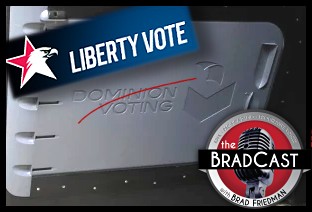 Trump-Allied GOP Partisan Buys Dominion Voting Systems: 'BradCast' 10/22/25
Trump-Allied GOP Partisan Buys Dominion Voting Systems: 'BradCast' 10/22/25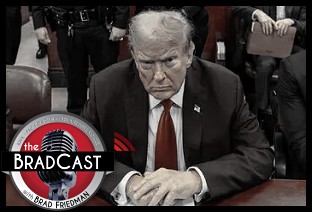 Trump, Republican Law(lessness) & (Dis)Order: 'BradCast' 10/21/25
Trump, Republican Law(lessness) & (Dis)Order: 'BradCast' 10/21/25 'Green News Report' 10/21/25
'Green News Report' 10/21/25 Celebrating 'No Kings': 'BradCast' 10/20/25
Celebrating 'No Kings': 'BradCast' 10/20/25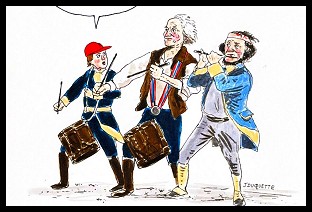 Sunday 'How It Started' Toons
Sunday 'How It Started' Toons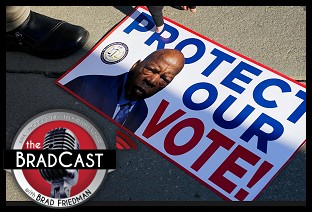 SCOTUS Repubs Appear Ready to Gut Rest of Voting Rights Act: 'BradCast' 10/16/25
SCOTUS Repubs Appear Ready to Gut Rest of Voting Rights Act: 'BradCast' 10/16/25 'Green News Report' 10/16/25
'Green News Report' 10/16/25 The 'Epstein Shutdown' and Other Autocratic Nightmares: 'BradCast' 10/15/25
The 'Epstein Shutdown' and Other Autocratic Nightmares: 'BradCast' 10/15/25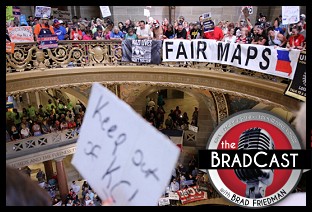 Group Vows to Block MO's GOP U.S. House Gerrymander: 'BradCast' 10/14/25
Group Vows to Block MO's GOP U.S. House Gerrymander: 'BradCast' 10/14/25 Trump Labor Dept. Warns Trump Policies Sparking Food Crisis: 'BradCast' 10/9/25
Trump Labor Dept. Warns Trump Policies Sparking Food Crisis: 'BradCast' 10/9/25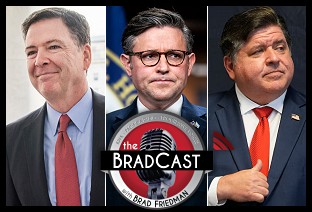 Trump's Losing Battles: 'BradCast' 10/8/25
Trump's Losing Battles: 'BradCast' 10/8/25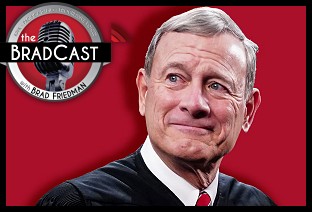 Trump, Roberts and His Stacked, Packed and Captured SCOTUS: 'BradCast' 10/7/25
Trump, Roberts and His Stacked, Packed and Captured SCOTUS: 'BradCast' 10/7/25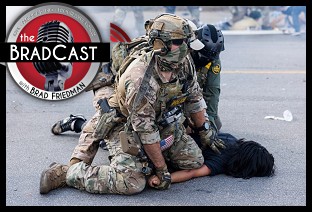 Trump Attempting His 'Invasion from Within': 'BradCast' 10/6/25
Trump Attempting His 'Invasion from Within': 'BradCast' 10/6/25 Biden Budget Expert: Mass Firings in Shutdown 'Illegal': 'BradCast' 10/2/25
Biden Budget Expert: Mass Firings in Shutdown 'Illegal': 'BradCast' 10/2/25 Why is DOJ Suing 'Blue' States for Their Voter Databases?: 'BradCast' 10/1/25
Why is DOJ Suing 'Blue' States for Their Voter Databases?: 'BradCast' 10/1/25
 VA GOP VOTER REG FRAUDSTER OFF HOOK
VA GOP VOTER REG FRAUDSTER OFF HOOK Criminal GOP Voter Registration Fraud Probe Expanding in VA
Criminal GOP Voter Registration Fraud Probe Expanding in VA DOJ PROBE SOUGHT AFTER VA ARREST
DOJ PROBE SOUGHT AFTER VA ARREST Arrest in VA: GOP Voter Reg Scandal Widens
Arrest in VA: GOP Voter Reg Scandal Widens ALL TOGETHER: ROVE, SPROUL, KOCHS, RNC
ALL TOGETHER: ROVE, SPROUL, KOCHS, RNC LATimes: RNC's 'Fired' Sproul Working for Repubs in 'as Many as 30 States'
LATimes: RNC's 'Fired' Sproul Working for Repubs in 'as Many as 30 States' 'Fired' Sproul Group 'Cloned', Still Working for Republicans in At Least 10 States
'Fired' Sproul Group 'Cloned', Still Working for Republicans in At Least 10 States FINALLY: FOX ON GOP REG FRAUD SCANDAL
FINALLY: FOX ON GOP REG FRAUD SCANDAL COLORADO FOLLOWS FLORIDA WITH GOP CRIMINAL INVESTIGATION
COLORADO FOLLOWS FLORIDA WITH GOP CRIMINAL INVESTIGATION CRIMINAL PROBE LAUNCHED INTO GOP VOTER REGISTRATION FRAUD SCANDAL IN FL
CRIMINAL PROBE LAUNCHED INTO GOP VOTER REGISTRATION FRAUD SCANDAL IN FL Brad Breaks PA Photo ID & GOP Registration Fraud Scandal News on Hartmann TV
Brad Breaks PA Photo ID & GOP Registration Fraud Scandal News on Hartmann TV  CAUGHT ON TAPE: COORDINATED NATIONWIDE GOP VOTER REG SCAM
CAUGHT ON TAPE: COORDINATED NATIONWIDE GOP VOTER REG SCAM CRIMINAL ELECTION FRAUD COMPLAINT FILED AGAINST GOP 'FRAUD' FIRM
CRIMINAL ELECTION FRAUD COMPLAINT FILED AGAINST GOP 'FRAUD' FIRM RICK SCOTT GETS ROLLED IN GOP REGISTRATION FRAUD SCANDAL
RICK SCOTT GETS ROLLED IN GOP REGISTRATION FRAUD SCANDAL VIDEO: Brad Breaks GOP Reg Fraud Scandal on Hartmann TV
VIDEO: Brad Breaks GOP Reg Fraud Scandal on Hartmann TV RNC FIRES NATIONAL VOTER REGISTRATION FIRM FOR FRAUD
RNC FIRES NATIONAL VOTER REGISTRATION FIRM FOR FRAUD EXCLUSIVE: Intvw w/ FL Official Who First Discovered GOP Reg Fraud
EXCLUSIVE: Intvw w/ FL Official Who First Discovered GOP Reg Fraud GOP REGISTRATION FRAUD FOUND IN FL
GOP REGISTRATION FRAUD FOUND IN FL

































